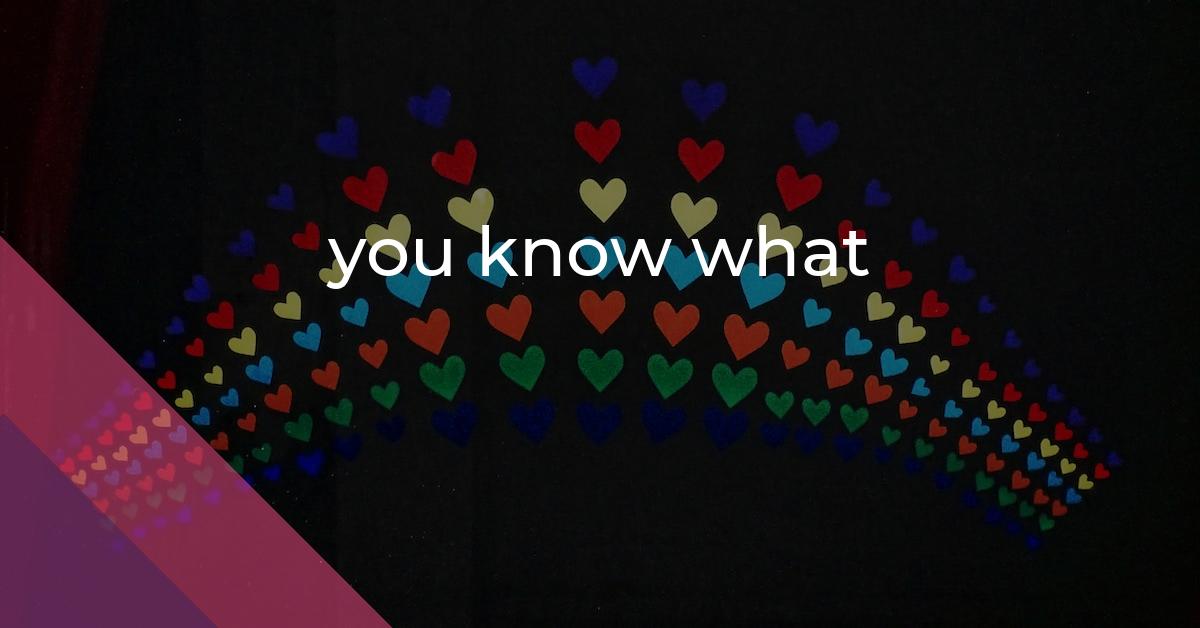you know what: Idiom Meaning and Origin
What does ‘you know what’ mean?
The idiom "you know what" is used as a phrase that often indicates that the speaker is trying to avoid saying something explicitly, assuming the listener already knows or will understand the unspoken message.

Idiom Explorer
The idiom "you what" is an informal expression typically used in British English to signify surprise, disbelief, or seeking clarification. It is often used rhetorically to question or challenge a statement or to express astonishment.
"You're telling me" is an idiomatic expression used to emphasize that the speaker already knows or agrees with what has been said. It is often used sarcastically or to show agreement with a statement that is obvious or well-known.
The idiom "you knows it" is an informal way of affirming that one is aware of something or agrees with a statement. It is often used to show confidence or enthusiasm.
The idiom "you know it" is used to affirm or emphasize one's knowledge or understanding of something. It is often used to express confidence, certainty, or agreement with a statement or question.
The idiom "wouldn't you know" is used to express a feeling of inevitability or irony about something that has happened. It implies that the outcome was expected or not surprising given the circumstances.
The idiom "what's what" means to understand or know the important or essential information about a subject or situation.
The idiom "what's going on" is used to inquire about the current situation or events, seeking information or understanding. It's a casual expression commonly used in conversations to ask about what is happening or to express confusion.
The idiom "what do you say" is a rhetorical question used to ask for someone's opinion or approval on a matter. It is a way of inviting the listener to express their agreement, disagreement, or suggestion.
The idiom "what can I say" is used to express a feeling of helplessness or inability to find words in a situation. It often conveys resignation or the acknowledgement that there is nothing more to be said or done.
Unveiling the Mystery
The idiom "you know it" is commonly used in everyday conversations. It is a phrase that we often use when we want to refer to something that the listener is already aware of or that is common knowledge. This idiom can be a useful way to avoid unnecessary repetition or to keep the conversation concise and streamlined.
When we say "you know it," we are assuming that the listener is familiar with the subject or topic being discussed. It is a way of acknowledging shared knowledge and understanding, without having to go into too much detail. For example, if we are talking about a popular movie that everyone has seen, we might say "you know it was a huge box office success."
"You know what is what" is another interesting idiom that is commonly used in English. This phrase is used to emphasize the importance of understanding the true nature or essence of something. When we say "you know what is what," we are suggesting that the listener already knows or should know the fundamental facts or principles of a particular situation or subject.
Using this idiom can be a way to highlight the significance of having a clear understanding or awareness. For instance, if we are discussing a complex issue in politics, we might say "you know what is what when it comes to the current economic policies."
Another idiom that we often use is "as you know." This phrase is typically used when we want to mention a fact or information that is already known to the listener. By saying "as you know," we are assuming that the listener is already aware of the specific knowledge or detail that we are about to mention.
This idiom can be a way to establish common ground or to remind the listener of a shared understanding. For example, if we are discussing a common tradition in our culture, we might say "as you know, we always celebrate this festival with a big feast."
Idioms like "you know it," "you know what is what," and "as you know" are commonly used in English to refer to shared knowledge, understanding, or assumptions. These phrases can help us avoid unnecessary repetition, emphasize the importance of understanding, or establish common ground in conversation. Using idioms effectively can make our speech more concise, coherent, and engaging.
Example usage
Examples of how the idiom "you know what" can be used in a sentence:
- "I'm tired of your excuses, you know what? I've had enough!" - In this example, the phrase is used to express frustration and emphasize the speaker's exasperation.
- "I was going to tell you the surprise, but you know what? I want to keep it a secret." - Here, the phrase is used to introduce a change of mind or a decision, indicating that the speaker has changed their initial plan.
- "You know what? Let's go grab some ice cream." - In this case, the phrase is used to make a sudden suggestion or proposal, expressing spontaneity or excitement.
More "Expression" idioms



